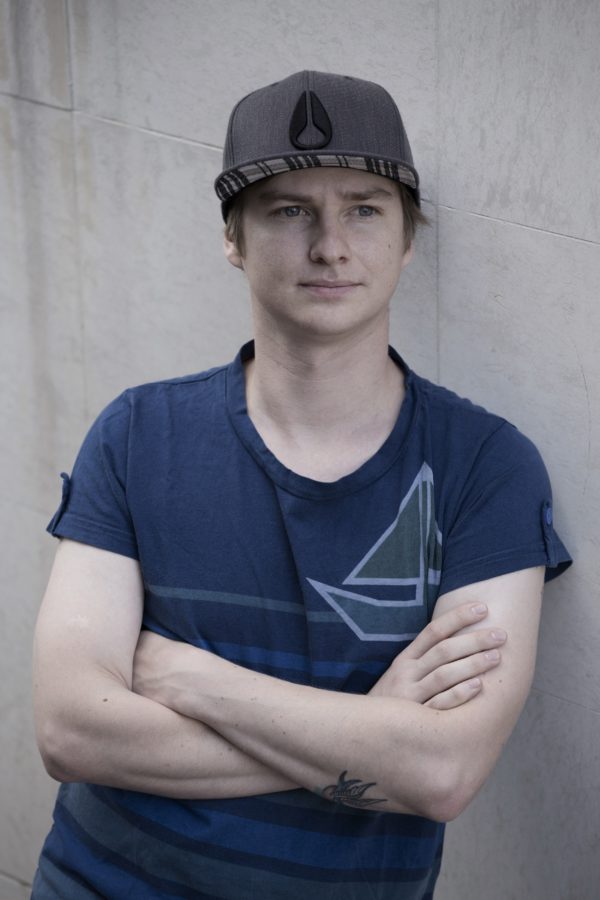about the production
Hamlet and Faust, the two canonical characters in the world’s literary drama appear side-by- side on stage in Nitra whist respecting each other. Nonetheless, they are no heroes of the past, but contemporary 30-somethings for whom the question of to be or not to be, and the struggle between the good and evil losses its existential essence. What keeps the two modern characters together with Shakespeare’s Hamlet and Goethe’s Faust is the testimony about the world and the place of the present-day young person within. In his two pieces Hamlet is Dead and Faust is Hungry and Choked on Gretchen Ewald Palmetshofer, the lauded Austrian playwright, portrays Hamletan–Faustian individuals unable to join the mainstream, the petty bourgeois conventional society. His characters come to face hypocrisy, the pain of broken relationships what leads them to self-destruction. If they merge with the society, they become equally rotten.
The Nitra-based theatre decided to engage in dramaturgical experiment and introduced both texts otherwise written separately two years apart. The texts are presented in a single evening and are prepared by two directors, Svetozár Sprušanský and Braňo Holiček.
In Hamlet is Dead, two siblings, Mani and Dani are returning home to celebrate their grandmother’s 95th birthday and, at the same time to attend the funeral of their friend. They meet their old friends, a young married couple Oli and Bína. Here comes the contrast and encounter of two different worlds: The siblings looking hopelessly into the future are fi g themselves face-to-face with the hypocrisy of naiveté, optimism and of the seemingly happy married couple. The young 30-somethings are confronted by their utterly odd family and the relationships within. It is their only possible way to survive within the context of hypocrisy, lies and the mysterious death of their grandmother. They don’t believe that they can be happy; they don’t see a sense or future in anything. in the world of Mani and Dani, the world of today, Hamlet and God are dead. The production by Svetozár Sprušanský is a family drama of existential dimension. In the spirit of the author, the director focuses on bizarre family relations the effect of which is that the siblings have grown into individuals unable to engage in societal ties. Through the actors Sprušanský manages to capture certain attempt at revolt, which, however, ends in the desperate state of getting through life, but not living. As director and dramaturge in one he is attentive to the motivations of his characters and, equally, places emphasis on word and action on stage.
In the second part of the production, Faust is Hungry, Braňo Holiček, unlike Sprušanský, brings all three couples on stage. He doesn’t individualise them, but transforms them into a choir, one voice-band. The characters arrive dressed in black, carrying a coffin. They gradually move to the microphones to – individually or together as a choir – reveal their mutual relations and the death of a child present on stage. It is a kind of contemporary Margarita destroyed by the Faustian egotistic desire and hunger. Hypocrisy and destructive morality triumphantly and plainly outweigh purity and naiveté. Similarly, to Goethe’s Faust, the Margarita of the 21st century gives in and dies. Under the direction by Holíček, all three actresses rotate in the role of Margarita. Similarly, all three male actors on stage get to play Faust. The work with microphones, voices and fi editing gives the production precision. The gloomy and funeral atmosphere of the wake is amplifying by the matter-of-fact and austere interpretation by actors that is made possible by the clear form and concept.
Both productions present a critical take on the present day and, particularly, on the generation of people who, in their 30s, are lifestyle trendsetters. The Nitra theatre, with its choice of Palmetshofer dramas and by presenting them together within a single evening responds to the current societal challenges and offers a dramatic analysis of the day.
Dáša Čiripová
“Should The Andrej Bagar wish, it can use the Hamlet is Dead – Faust is Hungry to address an entirely new audience: one that can hardly be drawn by mundane plots in crazy comedies and the archaic theatre language; an audience that grew up nursed by the stylish series such as the Breaking Bad or which prefers reading Lyotard to Danielle Steele. Contrary to what the theatre management, sadly, tends to think, there are no doubt plenty more people like those in Nitra as well as in Slovakia. Yet the piece also has the potential to pass to the ordinary audience in Nitra a new aesthetic and intellectual experience.”
Dominika Široká: Stepping out of mainstream. kød 9, pp 10–17
creators
directed by Svetozár Sprušanský, Braňo Holiček
dramaturgy: Svetozár Sprušanský
translation: Katarína Motyková
set design and costumes: Dorota Cigánková, Nikola Tempír
co-operation for movement: Barbora Miková
videoprojections: Gabriela Zigová
characters and cast: Mani, son: Jakub Rybárik, Dani, daughter: Barbora Andrešičová, Karolin, mother: Daniela Kuffelová, Kurt, father: Marcel Ochránek, Bine, good friend: Jana Kovalčíková, Oli, good friend: Roman Poláčik, Fritz: Juraj Hrčka, Anne: Anna Čonková, Paul: Juraj Ďuriš, Inez: Jana Labajová, Robert: Tomáš Turek, Tanja: Alena Pajtinková
director

Svetozár Sprušanský (1971) is artistic director and chief dramaturge at The Andrej Bagar Theatre in Nitra. As director he featured in a number of theatres in Slovakia and abroad: Chapter Art Cardiff in the UK or the Theatre in Dlouhá in Prague. In his work he captures the reality through plays by contemporary authors. The other line of his work involves provocative interpretation of the works by Russian classics. He featured at Divadelná Nitra with a number of productions: 2000 – The Seagull by A. P. Chekhov, 2002 – The Tax-Collector by Milan Uhde, 2003 – Chekhov’s Three Sisters, 2004 – The Anaerobes by Ingmar Villqist and 2009 – Chekhov ‘s The Cherry Orchard. His production and direction of the Three Sisters earned him the critics’ award Dosky; in the same categories he was nominated for the productions of the The Seagull, Uncle Vanya and The Cherry Orchard. He is laureate of multiple Literary Fund awards for as director and dramaturge. He is also hosting lecturer at the Department of Directing and Dramaturgy at the Theatre Faculty of the Academy of performing Arts in Bratislava, as well as author and director of radio plays.

Braňo (Branislav) Holiček (1985)
Popular Slovak theatre and film actor and director. He is with the Prague-based company Ypsilonka, also working with a number of Czech theatres, appearing on Czech television and in film productions. He received the Evald Schorm Prize in 2009 and 2011 for original plays Deep Blue World (upside down) and Me too [iJá]. As director of the Tomáš Klus video clip Sibyla he was nominated for the Anděl 2011 prize. 2012 brought him nomination for the Czech Penguin with his graduation production Massacre in Paris, having earned the 2013 Alfréd Radok Award as the Talent of the Year.
Materials available
Video of the production: yes
Script of the production: EN
If you are interested in these materials, write to archivy@nitrafest.sk
